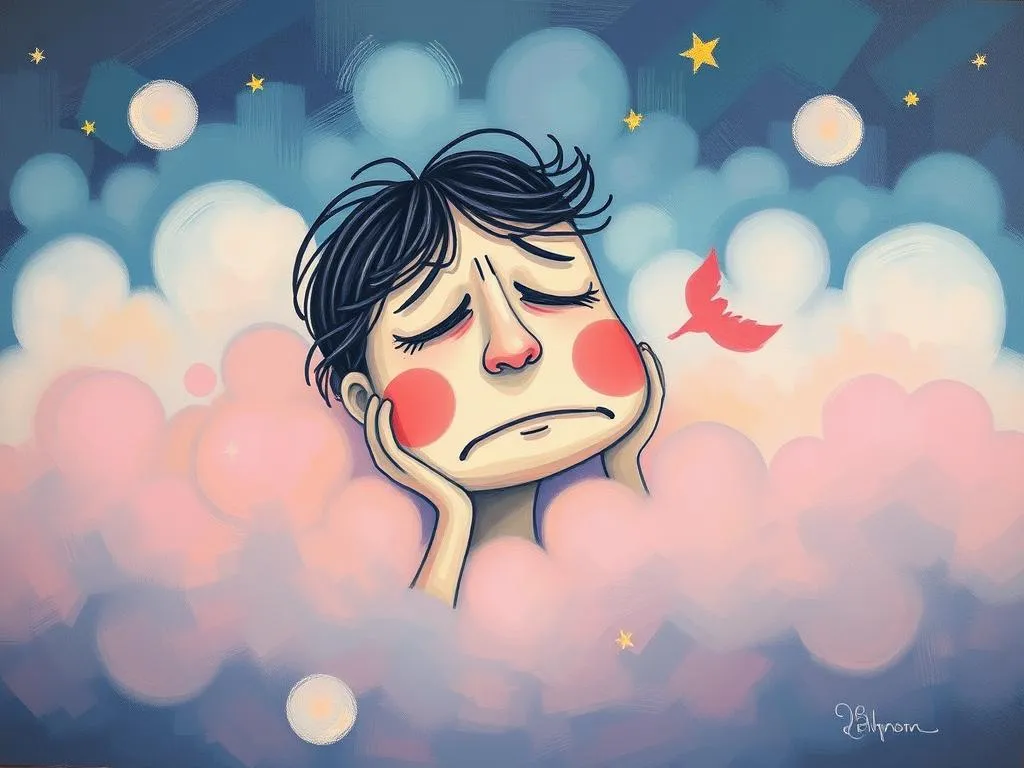
Have you ever awakened from a dream that felt so heavy, so palpable, that it lingered long after you opened your eyes? Perhaps it was a dream steeped in darkness, where shadows danced across your mind and emotions seemed to weigh you down. In our fast-paced world, where mental health is becoming a more significant discussion, it is crucial to understand the symbolism behind dreams that reflect a depressive episode. These dreams can serve as a mirror, reflecting our inner struggles and the emotions we may not fully grasp when awake.
In this article, we’ll delve into the rich tapestry of dream symbolism, explore real-life scenarios that many individuals face, and uncover pathways for personal growth. Let’s embark on this journey together, seeking to understand the messages our dreams impart about our mental and emotional well-being.
Into the Shadows: Unpacking the Symbols of Despair
Dreams that echo feelings of depression are often cloaked in symbolism that can reveal a wealth of insight. These symbols can vary widely depending on personal experiences, cultural backgrounds, and psychological states. Here are some of the most common symbols associated with depressive episodes in dreams:
-
Darkness and Shadows: Dreaming of being surrounded by darkness can signify feelings of isolation and hopelessness. Darkness often represents the unknown and the fear that accompanies it. Reflecting on these feelings can help you confront what lies beneath the surface.
-
Falling: A common dream theme, falling can indicate a loss of control or a fear of failure. This type of dream can evoke feelings of vulnerability, mirroring real-life pressures that can lead to a depressive state.
-
Water: Water in dreams is multifaceted, but when it appears murky or turbulent, it often symbolizes emotional turmoil. It can represent feelings of sadness or being overwhelmed by life’s challenges. Consider how water flows through your life and where you might feel stuck.
-
Being Trapped: Dreams where you find yourself confined or unable to escape often reflect feelings of entrapment in waking life. This could be related to a job, relationship, or even an internal struggle that feels inescapable.
-
Decay or Death: While death in dreams can often symbolize transformation, it can also reflect feelings of loss or despair. Dreaming of decay may symbolize neglected aspects of your life or a fear of change. What parts of your life feel stagnant or in decline?
By identifying these symbols, you can begin to untangle the complex emotions at play in your dreams. Understanding the root causes of these feelings can be the first step toward healing.
Walking Through the Fog: Real-Life Scenarios of Depressive Dreams
Now that we’ve explored the symbols behind depressive dreams, let’s look at some relatable scenarios that might resonate with you or someone you know. Each scenario reflects a different facet of the complex relationship between our waking lives and nighttime narratives.
-
The Job That Drains You: Sarah has been working a demanding job that leaves her feeling exhausted and unfulfilled. One night, she dreams of being in a dark office, surrounded by piles of paperwork that seem to multiply endlessly. She feels trapped and overwhelmed, unable to escape. This dream reflects her internal struggle with burnout and the desire for change.
-
The Broken Relationship: Mark dreams of wandering through a dark, abandoned house that once felt like home. He hears echoes of laughter but cannot find anyone. This dream symbolizes his feelings of loss and isolation after a recent breakup. The house, once filled with warmth, now reflects his emotional state—longing for connection but feeling utterly alone.
-
The Lost Opportunity: Emily often dreams of missing a bus or train, only to watch it disappear into the distance. This recurring dream symbolizes her fears of missed opportunities and feelings of inadequacy. Each time she wakes up, she grapples with feelings of frustration and anxiety about her future. What opportunities do you fear you might miss?
-
The Weight of Expectations: Jake dreams of carrying an enormous backpack up a steep hill, each step feeling heavier than the last. This dream encapsulates his feelings of being burdened by societal and familial expectations. He wakes up feeling drained, questioning the paths he feels obliged to follow.
-
The Circle of Friends: Rebecca finds herself at a vibrant party in her dream, but as she approaches her friends, they fade away into shadows. This reflects her feelings of social anxiety and fear of being unaccepted. The dream serves as a reminder of her need to cultivate genuine connections.
These scenarios illustrate how dreams can serve as a reflection of our inner worlds. By paying attention to the emotions and symbols present in these dreams, we can glean valuable insights into our waking lives.
From Darkness to Dawn: Cultivating Personal Growth
While dreams of depressive episodes can feel ominous and overwhelming, they also offer a unique opportunity for personal growth. Here are some practical insights on how to harness the wisdom of your dreams and transform those heavy feelings into actionable steps toward healing:
-
Keep a Dream Journal: Documenting your dreams can help you identify recurring themes and symbols. This practice allows for reflection and can lead to deeper insights about your emotional state. Make it a habit to write down your dreams first thing in the morning, capturing the essence before it fades.
-
Explore Your Emotions: Take time to sit with the emotions that arise from your dreams. Whether it’s journaling, talking to a friend, or meditating, exploring these feelings can help you process and understand them better. What emotions are surfacing, and how can you address them?
-
Seek Professional Support: If your dreams are deeply distressing or if you find yourself struggling with symptoms of depression, consider seeking guidance from a mental health professional. They can provide tools and strategies to help you navigate your feelings and improve your mental health.
-
Practice Self-Compassion: Recognize that it’s okay to feel overwhelmed or sad. Allow yourself to experience these emotions without judgment. Self-compassion can help you find a path forward, reminding you that you are not alone in your struggles. How can you show kindness to yourself during tough times?
-
Set Small Goals: If your dreams reveal areas of your life that feel stagnant, set small, achievable goals to create positive change. Whether it’s pursuing a new hobby, reconnecting with friends, or making changes at work, taking small steps can lead to significant progress over time.
As we navigate the complexities of our emotional landscapes, let us remember that dreams are not merely random occurrences in the night. They are powerful reflections of our inner selves, beckoning us to pay attention to the feelings we may be suppressing.
The weight of despair can feel heavy, but within those shadows lies the potential for understanding and growth. By embracing the messages delivered through our dreams, we can embark on a journey toward healing, transforming our nighttime narratives into tools for personal empowerment.
In closing, consider this powerful reflection: What if your dreams are not just a product of your mind at rest, but rather a guiding light, illuminating the path toward self-discovery and emotional healing? Embrace the shadows, for they often hold the keys to your own transformation.







